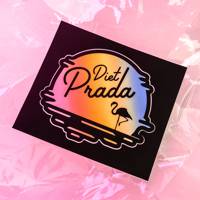“The time was going to come that we’d need to own it, eventually,” Schuyler told the Business of Fashion in May 2018, during Diet Prada’s official unmasking. Their quest for authority, and to establish themselves as two people with an opinion that matters, has granted Vogue an email interview with “DP” in between their day jobs and the industry events that their exposed identities now affords them.
“We weren't at the point then that we are now,” DP explains of playing down the hype around the account – an amalgam of two fashion addictions: Miuccia Prada and Diet Coke – a year ago. “Now that our work is having a real impact that's often positive, we're excited to own it.”
Acerbic commentary with a healthy dose of acronyms and exclamation marks seems to have become an effective formula to help whip fashion into shape. “We've already seen several retailers this year having to remove copied product, which gives us a huge sense of accomplishment,” DP shares. “We're definitely still doing it for the LOLs, but now there's an added element of trying to drive change.” Cult brands, such as Australian-based Daisy, get the biggest responses, because they established their businesses on Instagram, and garnered loyal fan bases while doing so.
An increased amount of followers has translated into a responsibility to use Diet Prada as a platform to talk about social issues, such as diversity, equality and cultural appropriation, that fashion often sweeps under the carpet. “It's a high-stakes industry when you look at the numbers, but it leads to a lot of repetition,” DP notes. “People need to look with their hearts more, and trust new ideas, new designers.”
Greater transparency within the industry, such as the model #MeToo movement, has aided their quest. “I think social media has been great in breaking down the fourth wall on the fashion industry,” DP continues. “We're seeing more from the inside than ever before and that's helping to spur change, whether that's fair treatment of models, contractors, employees, or appropriate use of inspiration.”

The pair is looking for ways to take on the project full time and support themselves, but it’s currently a labour of love supplemented by the small merch offering on Dietprada.com and copywriting gigs. “It can be hard to collab with brands doing what we do,” DP muses of how to take the whip smart character they have created into the big league. “Who can say who is wholly original, or without fault. There have been a lot of projects that we were approached about that we didn’t want our name tied to, and ultimately rejected.”
Saying yes to Gucci in September 2017, however, paid off. “It was like a crazy dream,” DP recalls of the Instagram takeover during the spring/summer 2018 show. “From ideation to execution it came together very quickly. Before we knew it, we were backstage in Milan meeting Alessandro Michele. It really felt like everything was coming together then – we'd had the account for nearly three years and had just passed 30k followers, who were comprised of a good chunk of the fashion industry.”
Vogue editor-in-chief Edward Enninful, and contributing editors Naomi Campbell and Pat McGrath, are among the list of famous names populating DP’s followers, who each tune in for a daily dose of sartorial observations and takedowns. “Someone once said they thought Joan Rivers had sent us from hell to keep doing her work. It's the best compliment we've ever gotten,” DP shares. “Our sense of humour has a lot of parallels. Generally, it's more about keeping each other in check, so we're funny without being too vicious!”
They split the posts evenly, consulting each other via text, talking to their Dieters – “our unofficial street team” – and aiming to read all the DMs. “We have so many great conversations every day with people all over the world, it’s so cool.” For big posts, like red-carpet coverage and fashion weeks, they get together to collaborate, but they don’t punish themselves for having personal lives too. “If we're both busy, then, sorry, not so many stories!”
The detractors – Stefano Gabbana, in particular, is not afraid to retaliate in the comment section – don’t keep them awake at night. “Brands that are mad that they keep getting featured should take it as a wake-up call that they need to do better,” DP asserts. “Our content shows people you don't have to stomach all the BS the industry tries to feed us daily, but by presenting it with a dose of humour we keep it from being too heavy. We try to laugh [confrontation] off.”
Do they worry about a future where Instagram doesn’t have such social sway? “Instagram has become integrated into so many people's lives, we're going to be dealing with it for a long time. It also seems to act on user feedback really well,” DP notes. Besides, “there's always drama going on in the world of fashion and design,” and something to keep fuelling their feed. DP’s job is to keep securing the scoops, which shape it as a intelligent authority, and that can implement social activism both online and IRL.

No comments:
Post a Comment